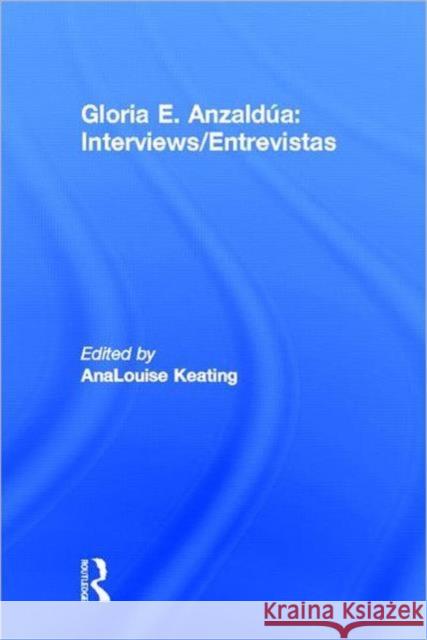Interviews/Entrevistas » książka



Interviews/Entrevistas
ISBN-13: 9780415925037 / Angielski / Twarda / 2000 / 320 str.
Interviews/Entrevistas
ISBN-13: 9780415925037 / Angielski / Twarda / 2000 / 320 str.
(netto: 721,53 VAT: 5%)
Najniższa cena z 30 dni: 680,04
ok. 16-18 dni roboczych.
Darmowa dostawa!
Gloria E. Anzaldua, best known for her books Borderlands/La Frontera and This Bridge Called My Back, is often considered as one of the foremost modern feminist thinkers and activists. As one of the first openly lesbian Chicana writers, Anzaldua has played a major role in redefining queer, female and Chicano/a identities, and in developing inclusionary movements for social justice.
"The book brings together difficult-to-access materials that provide considerable insight into an unusual life." -- Publishers Weekly
"For the prolific lesbian Chicana author, interviews are another kind of oral writing that provides an immediacy, an openness, and a self-exposure greater that that of any spontaneity in her meticulously revised publications. These dialogues and conversations give Anzaldua's perspectives on her work, the multiple and overlapping realities of her life, her beliefs about fluid sexual identities and desires, and her theories on convergence--a way of writing that combines the sexual, the mental, the emotional, and the psychic-supernatural in a written stream-of-consciousness." -- Booklist
"This impressive collection of interviews offers us a sustained look at Gloria Anzaldua's insistence on theorizing the personal and on infusing the political with the poetic--words which have shaped feminist theories and practices over the last two decades." -- Angela Davis
"All of [Anzaldua's] writing draws upon intensely personal sources, which makes interviews with her so enlightening." -- San Antonio Express-News
"This memoir-like collection will appeal especially to the author's longtime fans." -- Curve
"Gloria Anzaldua's boundless generosity of spirit glows throughout these interviews. I especially enjoy her ideas about space/time and the nature of reality (or the many realities...)." -- Leslie Marmon Silko, author of Almanac of the Dead
Acknowledgments -- Risking the Personal -- An Introduction -- 1. Turning Points -- An Interview with Linda Smuckler (1982) -- Early Writing Experiences; Grade School; High School; A Sense of Difference; College; "My Task": Making Face, Making Soul, Making Heart; Sexuality/Spirituality/Writing; First Turning Point: Teaching (and) Chicano Culture; Second Turning Point: Entering the Feminist Movement; The "Path of Writing"; Third Turning Point: Becoming a Full-Time Writer; Another Turning Point: Teaching "La Mujer Chicana"; This Bridge; Audience and Voice; Publishing and "El Mundo Zurdo"; Writing the Body, Becoming a Mouth; Other Influences -- 2. Within the Crossroads -- Lesbian/Feminist/Spiritual Development An Interview with Christine Weiland (1983) Early Life; Bodies and Health; Religions; "Yoga of the Body"; "Off the Rational Track"; Meditations, Making Love to the Divine; Spirituality and Power; Becoming Lesbian?; Ethnic Pride, Worldwide Oneness; "The Gathering of the Tribe"; "La Facultad" -- 3. Lesbian Wit -- Conversation with Jeffner Allen (late 1980s) -- Labels; Shapeshifting, Changing Identities; Bridges, Rainbows, Coalitions; Reading; Compartmentalized Identities; Imaginai, Psychic Identities; Lesbian Writings and Audiences -- 4. Making Choices 151 -- Writing, Spirituality, Sexuality, and the Political -- An Interview with AnaLouise Keating (1991) -- This Bridge and Haciendo Caras; New Interconnections: Moving from Unity to Solidarity; Spirituality: "Roots," Masks, Essentialism; Becoming Lesbian?; Always on the Other Side/del otro lado: Differences, Lesberadas; Representation: Individual and Collective "We" -- 5. Quincentennial -- From Victimhood to Active Resistance -- Inés Hernández-Ávila y Gloria E. Anzaldúa (1991) Claiming Agency; Resistance; Originality; The New Tribalism; Mestizas as Bridges; "Las Tres Madres" -- 6. Making Alliances, Queerness, and Bridging Conocimientos -- An Interview with Jamie Lee Evans (1993) -- Making Alliances; Shifting Power; Anthologizing Alliances; Identity: The Power of Self-Invention; Conocimientos -- 7. Doing Gigs -- Speaking, Writing, and Change -- An Interview with Debbie Blake and Carmen Abrego (1994) -- ¿ Queer Conference ?; The New Tribalism; Knowledge, Conocimientos, and Power; Fighting/Theorizing Racism; Coalition Work: Bridge, Drawbridge, Sandbar, Island; Revisionist Mythmaking; Essentializing, Universalizing, and the Autobiographical; Lived Experience/ Representation; Making Soul: Writing the Coatlicue State, Nepantla, Llorona; Impact on Readers; "Doing Gigs" -- 8. Writing -- A Way of Life -- An Interview with María Henríquez Betancor (1995) -- Chicana Writers; Identity-in-Process: A "Geography of Selves"; Relational Identities; "Autohistorias, Autohisteorias"; Language Conflicts; "On The Edge, Between Worlds"; The Ethnic Test: Who's the Real Chicana?; Writing/Reading as Survival and Healing -- 9. Toward a Mestiza Rhetoric -- Gloria Anzaldúa on Composition, Postcoloniality, and the Spiritual -- An Interview with Andrea Lunsford (1996) -- Early Memories of Writing; Nos/otras; Postcolonial Studies, Composition Studies; Writing: Difficulties and Practices; Teaching Composition: Assimilation, Resistance, Liberation; Language, Domination; Composing the Work, the Self, the World; Claiming Author(ity); Style; Activism, Working for Change; Additional Bits -- 10. Last Words? Spirit Journeys -- An Interview with AnaLouise Keating (1998-1999) -- Dealing with Criticism and Controversy; Ignoring the Spiritual; Shapeshifting; Interconnections; Anger; Physical Health, Bodies, and Identity Formation; The Importance of Listening -- Primary Works Cited -- The Interviewers -- The Authors -- Index.
Gloria E. Anzaldúa is the author of Borderlands/La Frontera: The New Mestiza, Friends from the Other Side/Amigos del otro lado, and Prietita and the Ghost Woman/ Prietita y la Llorona, editor of Making Face, Making Soul/Haciendo Caras: Creative and Critical Perspectives by Women of Color, and co-editor of This Bridge Called My Back: Writings by Radical Women of Color. Anzaldúa has played a pivotal role in redefining US feminisms, cultural studies, Chicano/a issues, US American literature, ethnic studies, queer theory, and postcolonial theory.
AnaLouise Keating is Associate Professor of English at Aquinas College. In addition to Women Reading Women Writing: Self-Invention in Paula Gunn Allen, Gloria Anzaldúa, and Audre Lorde, she co-edited Perspectives: Gender Studies and has published articles on critical "race" theory, queer theory, Latina writers, African American women writers, and pedagogy.
1997-2026 DolnySlask.com Agencja Internetowa
KrainaKsiazek.PL - Księgarnia Internetowa









